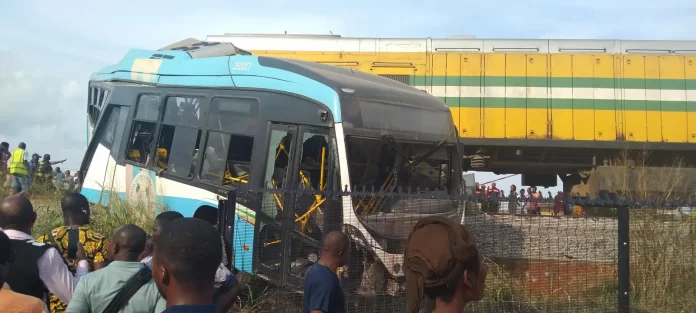While the politicians were brawling over the results of the last presidential and National Assembly elections a distraction occurred in Shogunle, Ikeja, Lagos State. If it had been a pleasant distraction it would have been that: pleasant. This was a horrible accident between a train and a BRT bus in the early hours of Thursday last week. The bus, modern, airconditioned, with all the trappings of a travelling equipment that could make travelling in Lagos with its grinding traffic gridlock, a little rosy, collided with a fast moving train opposite the Public Works Department (PWD) bus station at Shogunle.
No one can fool around with a train when it is racing on its track like a prized racehorse. When it is on its track it shows no mercy to anything or anyone on its path. It just crushes it or him. On this beautiful Thursday morning the bus assigned to carry hoards of people to work at the Alausa Secretariat in Ikeja from Ikotun was gliding along the highway.
According to various sources, the level crossing keeper was there at his duty post and as the train was approaching he raised his red flag, meaning that all living and non-living things must give way to the fast moving train. If he flashes a yellow flag to the train’s driver it means he is free to keep going. He did his duty as he was taught but apparently the bus driver was too much in a haste. He insanely pushed his bus into the path of the train and it was squashed.
The Chief Mechanical Engineer and Lagos District Manager of the Nigeria Railway Corporation (NRC) Mr Augustine Arisa told The Punch newspaper that from the collision the train had pushed the bus to a distance of about 100 metres because of the train’s lightning speed.
From that accident, six people have died and 102 others were admitted at the Lagos University Teaching Hospital in Ikeja and some other hospitals. That shows the gravity of the accident. Some of the passengers in the bus claim that the driver had earphones on and may not have heard what needed to be heard as a restraint when they were telling him not to cross the rail line. If he didn’t hear the words of restraint didn’t he also see the red flag of the level crossing keeper? In any case, the level crossing keeper says even if you have earphones on when a train is approaching you cannot miss it because the ground vibrates as a warning to you that death is on the way. Death may be nature’s way of telling us to slow down. But that is a lesson that is the equivalent of medicine after death.
Even though the driver who is reportedly undergoing psychiatric and drug tests has apologised to the victims of the accident, he cannot bring back those who are dead and gone. It is true that death is always around where human beings are but the other truth is that most deaths are man-induced just as this one. If the driver had shown patience and waited for a few seconds for the train to glide past, there would have been no collision and if there was no collision there would have been no death or injuries.
The papers report that the driver tried to escape after the accident but some young men who were present at the scene of the accident arrested him. Now, he is cooling his feet at the police station where he is expected to help the police in determining what was the cause of the accident that took some lives and some limbs? He is already singing like a canary claiming that the bus had a fault.
The police, masters in the art of combing out the truth by means lawful and unlawful, are likely to ask him the following questions: what was the nature of the fault in the bus? When did you notice the fault? When you took off from Ikotun or when you got to the level crossing? Was it a fault that did not stop the bus from moving into the line of danger? Was the break in the bus faulty? If the break was faulty how were you able to drive from Ikotun to where the accident occurred? They will also ask him whether he took ogogoro or Indian hemp that morning before he took off. And whether he slept in his house or at a harlot’s place the day before. And when was the last time he slept with his wife or girlfriend. They will ask him a lot more questions, both useful and useless. It is then that he will realise that his life has turned a new page.
The statistics of the accident are scary. Six human beings dead, 19 discharged so far, others in critical condition bringing the total number of affected persons to 102. With the way the accident occurred some innocent standers-by may have been affected too. The State Governor, Mr Babajide Sanwo-Olu, moved promptly to hospitals to see the injured. He also offered words of condolence to the relations of the dead. He has also declared three days of mourning during which period the flags will fly at half-mast. He has done a lot to improve transportation in Lagos, but the BRT drivers, for example, have been a major problem.
There have been several stories of some lousy BRT drivers raping or attempting to rape some passengers late at night on lonely roads that they choose to ply with mischief in mind. This particular BRT driver who was involved in the accident with the train definitely has a load of questions to answer. The level crossing keeper says that he flagged down the driver more than five times with the red flag but he refused to obey. He shouted in addition but the driver simply ignored him. This story has been corroborated by some of the passengers who said that they also told him to stop but he did not listen. The level crossing keeper says that some of the drivers often show extreme impatience. “When I show them the red flag they will hiss and move on.
When terrorists attacked the Kaduna-Abuja train last year most people thought the Federal Government did not take adequate precautions to ensure the security of its trains and passengers. That was when the Minister of Transportation, Mr Rotimi Amaechi, said that he brought a company that was to take care of that aspect of the job but the Federal Executive Council (FEC) shot it down. A few days later it emerged that the FEC felt that the company Amaechi recommended was not well qualified for the job. But the FEC failed to locate and engage a well-qualified company for the job. That negligence led to that incident whereby many passengers were killed or captured and taken into captivity.
Trains have some peculiarities in terms of management because they pass through all kinds of terrains, inhabited or uninhabited. Certain precautions are therefore taken in many countries to ensure their safety and the safety of their passengers. Some of the safety precautions taken by some countries in the management of their trains include safety seminars for staff and the public; Handbills are distributed to road users near train tracks; advertisements are published regularly in various media on rail safety. Also passengers are asked not to carry combustible articles such as petrol, kerosene, oil, diesel, films, fireworks, gas cylinders etc. so as to prevent fire accidents. Passengers are also not expected to smoke in trains and in their stations. If the level crossings are unmanned passengers and vehicles are expected to stop before the stop board. Passengers are not expected to guess the speed of trains or to cross the track when the train gives a sound.
A lot more has to be done in Nigeria on enlightenment. The train is just coming back to Nigeria as a new, adorable phenomenon that must be appreciated and patronised, thanks to President Muhammadu Buhari. Much as we admire the exotic nature of modern trains we must school our people on the basics of train safety, within and around train tracks and stations. It is the presence of a high level of safety that can encourage more people to patronise trains as another form of quick transportation.
But if accidents of different types continue to occur, people who would like to enjoy a comfortable train ride may be discouraged. Trains can add to an increase in the choice of comfortable means of travel available to us for use. We must enjoy them without causing an increase in the rate of avoidable accidents that can lead to the loss of lives and limbs as it happened last Thursday at Shogunle in Ikeja. It is one thing for the government to provide these facilities for our comfort but we also have the duty of using them as responsible human beings who appreciate the government’s good gesture.



